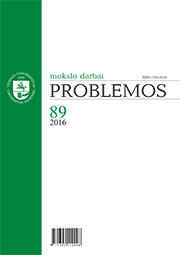IANO HACKINGO ISTORINĖS ONTOLOGIJOS IR MICHELIO FOUCAULT GENEALOGIJOS SĄSAJOS
THE RELATION BETWEEN IAN HACKING’S HISTORICAL ONTOLOGY AND MICHEL FOUCAULT’S GENEALOGY
Author(s): Marius MarkuckasSubject(s): Metaphysics, Epistemology, Ethics / Practical Philosophy, Contemporary Philosophy, Structuralism and Post-Structuralism, Philosophy of Language, Hermeneutics
Published by: Vilniaus Universiteto Leidykla
Keywords: hacking; historical ontology; human kinds; Foucault; genealogy;
Summary/Abstract: In the article, the social research method of historical ontology developed by Ian Hacking is presented alongside with the overview of the key conceptual sources of this method. My main focus is on the discussion of the relation between Hacking’s historical ontology and Foucault’s genealogy. It is shown that despite the fact of Foucault’s significant theoretical influence upon Hacking’s thinking, there are differences between the approaches to history that base the historical ontology and genealogy as the construction field of social reality and its modus of being. It is concluded that in the historical ontology the acknowledgement of “language games”, but not as a constitutive mechanism of social reality as in the case of genealogy “power games”, enabled Hacking to radicalize the antiessentialist concept of this sort of reality as “non-existent entity”, or quasi-reality, i.e. “marked out” as purely linguistic entity. It is also stated that, on the one hand, for Hacking the fundamental “languagability” of social reality has opened up the possibility to identify and explicate constructivist and nihilistic nature of (post)modern ethics, but, on the other hand, it contained “neutralization” and ethical “aestheticization” tendency of the modern social engineering, as an external coercion applied in respect of individuals.
Journal: Problemos
- Issue Year: 2016
- Issue No: 89
- Page Range: 35-47
- Page Count: 13
- Language: Lithuanian

